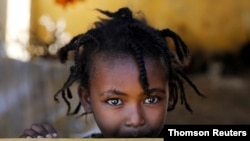As conflict escalates in the Tigray region of Ethiopia, UNICEF is underscoring the need for continual aid for affected children amid a worsening situation.
“Five months since the start of the conflict, a clearer picture is emerging of killings and sexual violence against women and children in Tigray. The reported murder of at least 20 children at Maryam Dengelat Church last November will continue to haunt families and communities,” said UNICEF Executive Director Henrietta Fore in a statement released Friday.
The U.N. International Children's Emergency Fund reports schools and health centers have been looted, vandalized and occupied by armed groups. In addition, deliberate attacks have been ordered on health facilities, limiting health services available to help those in need.
“According to assessments conducted at the end of February 2021, violence and looting have left nearly 60% of health care facilities not operational. Some 57% of boreholes (providing water) in 13 towns surveyed are not functional and a quarter of the region’s schools have sustained damage from the conflict,” said Fore.
UNICEF is continuing to work with its partners to ensure humanitarian aid gets to those in need, as well as increasing its presence in the region.
Despite this, UNICEF warns that humanitarian aid alone is not enough, citing the need for protection, reporting and monitoring.
“Parties to the conflict must ensure that children are protected from harm at all times. Basic service outlets, such as health centers and schools, must be protected and the safety and security of everyone working in and accessing those services guaranteed,” said Fore.
Aid groups have been struggling to gain access to the region since the beginning of the Tigray conflict, when Nobel Prize-winning Ethiopian Prime Minister Abiy Ahmed ordered his forces to respond to an alleged raid on an army camp in the region. The region’s main party, the Tigray People's Liberation Front, responded by taking control of parts of the army’s northern command post.
The conflict, combined with a media blackout and government-imposed restrictions, has left humanitarian organizations unable to provide adequate aid, and they have had difficulty accurately gauging the need.





